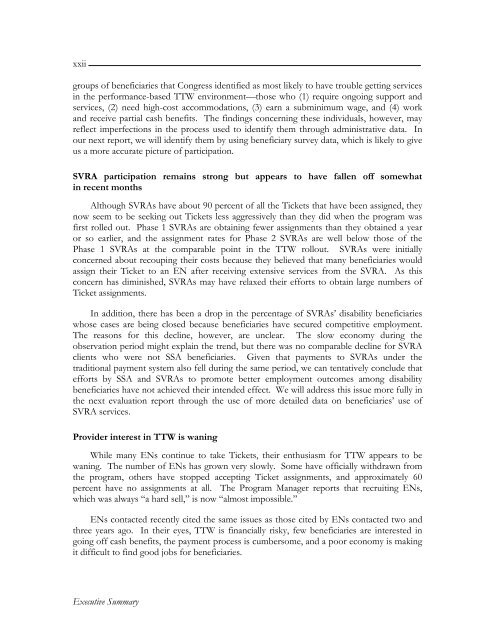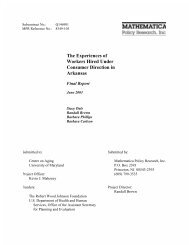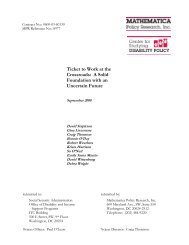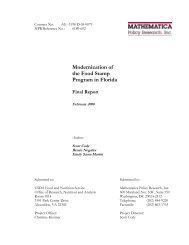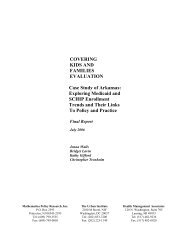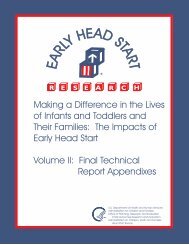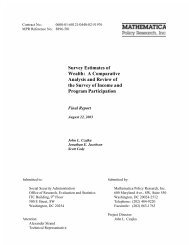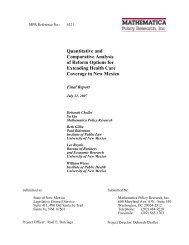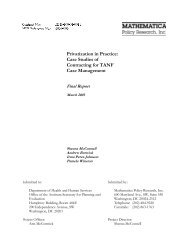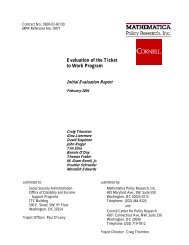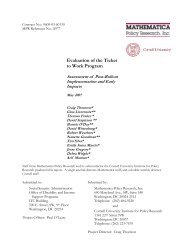Evaluation of the Ticket to Work Program, Implementation ...
Evaluation of the Ticket to Work Program, Implementation ...
Evaluation of the Ticket to Work Program, Implementation ...
Create successful ePaper yourself
Turn your PDF publications into a flip-book with our unique Google optimized e-Paper software.
xxiigroups <strong>of</strong> beneficiaries that Congress identified as most likely <strong>to</strong> have trouble getting servicesin <strong>the</strong> performance-based TTW environment—those who (1) require ongoing support andservices, (2) need high-cost accommodations, (3) earn a subminimum wage, and (4) workand receive partial cash benefits. The findings concerning <strong>the</strong>se individuals, however, mayreflect imperfections in <strong>the</strong> process used <strong>to</strong> identify <strong>the</strong>m through administrative data. Inour next report, we will identify <strong>the</strong>m by using beneficiary survey data, which is likely <strong>to</strong> giveus a more accurate picture <strong>of</strong> participation.SVRA participation remains strong but appears <strong>to</strong> have fallen <strong>of</strong>f somewhatin recent monthsAlthough SVRAs have about 90 percent <strong>of</strong> all <strong>the</strong> <strong>Ticket</strong>s that have been assigned, <strong>the</strong>ynow seem <strong>to</strong> be seeking out <strong>Ticket</strong>s less aggressively than <strong>the</strong>y did when <strong>the</strong> program wasfirst rolled out. Phase 1 SVRAs are obtaining fewer assignments than <strong>the</strong>y obtained a yearor so earlier, and <strong>the</strong> assignment rates for Phase 2 SVRAs are well below those <strong>of</strong> <strong>the</strong>Phase 1 SVRAs at <strong>the</strong> comparable point in <strong>the</strong> TTW rollout. SVRAs were initiallyconcerned about recouping <strong>the</strong>ir costs because <strong>the</strong>y believed that many beneficiaries wouldassign <strong>the</strong>ir <strong>Ticket</strong> <strong>to</strong> an EN after receiving extensive services from <strong>the</strong> SVRA. As thisconcern has diminished, SVRAs may have relaxed <strong>the</strong>ir efforts <strong>to</strong> obtain large numbers <strong>of</strong><strong>Ticket</strong> assignments.In addition, <strong>the</strong>re has been a drop in <strong>the</strong> percentage <strong>of</strong> SVRAs’ disability beneficiarieswhose cases are being closed because beneficiaries have secured competitive employment.The reasons for this decline, however, are unclear. The slow economy during <strong>the</strong>observation period might explain <strong>the</strong> trend, but <strong>the</strong>re was no comparable decline for SVRAclients who were not SSA beneficiaries. Given that payments <strong>to</strong> SVRAs under <strong>the</strong>traditional payment system also fell during <strong>the</strong> same period, we can tentatively conclude thatefforts by SSA and SVRAs <strong>to</strong> promote better employment outcomes among disabilitybeneficiaries have not achieved <strong>the</strong>ir intended effect. We will address this issue more fully in<strong>the</strong> next evaluation report through <strong>the</strong> use <strong>of</strong> more detailed data on beneficiaries’ use <strong>of</strong>SVRA services.Provider interest in TTW is waningWhile many ENs continue <strong>to</strong> take <strong>Ticket</strong>s, <strong>the</strong>ir enthusiasm for TTW appears <strong>to</strong> bewaning. The number <strong>of</strong> ENs has grown very slowly. Some have <strong>of</strong>ficially withdrawn from<strong>the</strong> program, o<strong>the</strong>rs have s<strong>to</strong>pped accepting <strong>Ticket</strong> assignments, and approximately 60percent have no assignments at all. The <strong>Program</strong> Manager reports that recruiting ENs,which was always “a hard sell,” is now “almost impossible.”ENs contacted recently cited <strong>the</strong> same issues as those cited by ENs contacted two andthree years ago. In <strong>the</strong>ir eyes, TTW is financially risky, few beneficiaries are interested ingoing <strong>of</strong>f cash benefits, <strong>the</strong> payment process is cumbersome, and a poor economy is makingit difficult <strong>to</strong> find good jobs for beneficiaries.Executive Summary


